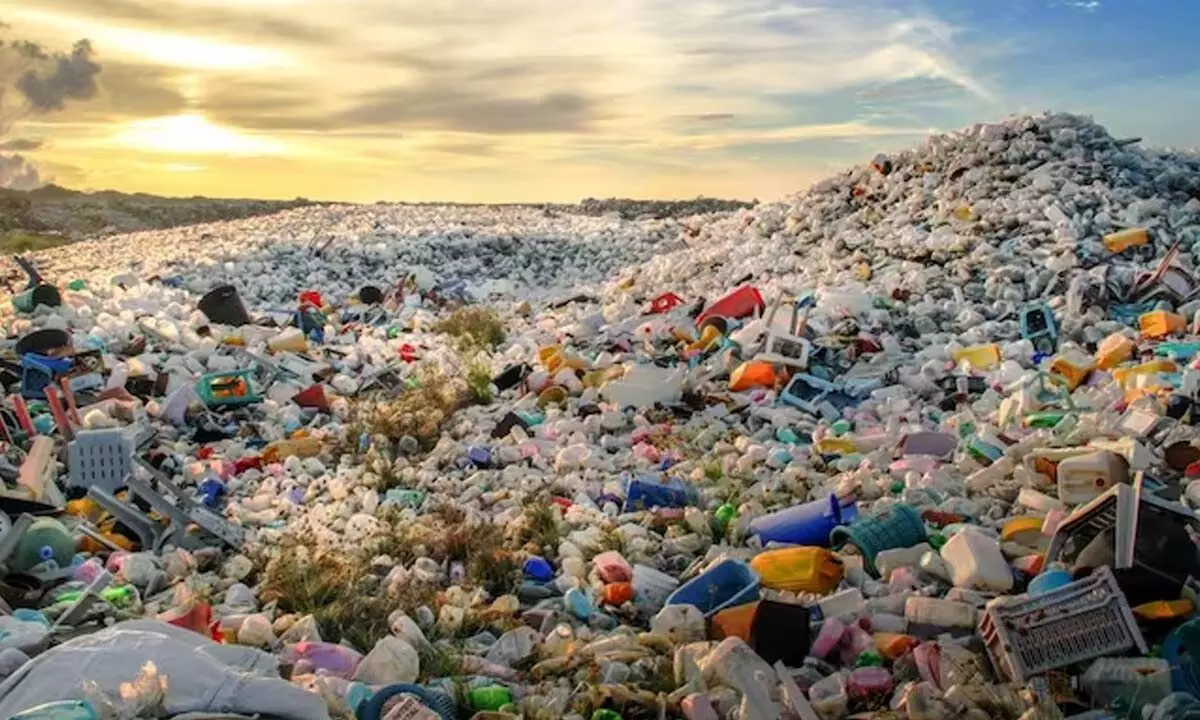Live
- Tanks, canals remain neglected despite execution of MGNREGS works
- BRS to celebrate Deeksha Diwas on Nov 29, Dec 9
- NCC Day grandly celebrated at SITAM
- CITU demands rollback of strategic sale of VSP
- 7-Year-old girl sexually assaulted in Tirupati
- PM Modi highlights govt's efforts to make Odisha prosperous and one of the fastest-growing states
- Hezbollah fires 200 rockets at northern, central Israel, injuring eight
- Allu Arjun's Family Appearance on Unstoppable with NBK Breaks Viewership Records
- Unity of hearts & minds essential for peace & progress, says J&K Lt Governor
- IPL 2025 Auction: I deserve Rs 18 cr price, says Chahal on being acquired by Punjab Kings
Just In
Karnataka coastline, Plastic pollution remediation :state may go for a WB loan of 840 crores


In a bid to tackle the mounting threat of plastic pollution along the Karnataka coast and safeguard the rich biodiversity of the Western Ghats, the Forest, Biology, and Environment Minister, Ishwara B Khandre, has endorsed an expanded version of the Blue Pack project proposed by a team of World Bank experts
Bengaluru: In a bid to tackle the mounting threat of plastic pollution along the Karnataka coast and safeguard the rich biodiversity of the Western Ghats, the Forest, Biology, and Environment Minister, Ishwara B Khandre, has endorsed an expanded version of the Blue Pack project proposed by a team of World Bank experts. The initiative aims to curtail the influx of plastic waste into the sea, which has been devastating marine life and coastal ecosystems.*
During a recent visit to the area, a team of experts from the World Bank, led by senior environmental economist Pablo C., engaged in discussions with local authorities, including the minister. The alarming reality of 50 tons of plastic waste accumulating daily along the 317 km coastline was a cause for concern, particularly due to its severe implications for marine life, including turtles that rely on these shores for nesting.
Recognizing the urgency of the situation, Minister Khandre directed officials from the Environment Department to formulate a Detailed Project Report (DPR) for the proposed initiative. The primary focus of the project is to control the inflow of single-use plastics into the coastal environment, which poses grave threats to both human health and the delicate ecosystem.
The approach to address this issue involves the active participation of coastal fishermen. During their breaks from fishing, these fishermen would engage in the removal of plastic waste that has accumulated on the seabed. The initiative not only benefits the environment but also provides an alternative source of income for these local communities, potentially making plastic waste collection more profitable than traditional fishing activities.
Blue Pack project, estimated to cost Rs 840 crore, is set to receive 70% of its funding from the World Bank through a loan, with the state government contributing the remaining 30%. Notably, the Preliminary Plan Report (PPR) for the project has garnered support from the Niti Aayog and the Union Ministry of Environment, Forests, and Climate Change, signifying a collaborative effort to combat plastic pollution on a broader scale.
Senior officials from the Forest and Environment Department, including Brijesh Kumar Dixit and Vijay Mohan Raj, were present during the discussions, highlighting the government's commitment to addressing the plastic menace and ensuring the sustainability of the coastal ecosystems for future generations.
Plastic waste is not merely an eyesore on our shores; its impact reverberates throughout the marine ecosystem. Marine animals unwittingly consume or become entangled in plastic debris, leading to suffocation, strangulation, and ingestion of toxic substances. The repercussions extend to larger species, disrupting food chains and compromising biodiversity. Beyond its direct impact on wildlife, plastic pollution also fragments into microplastics, infiltrating the food chain and potentially endangering human health.
Speaking to Hans India the members told “Confronting the plastic menace demands innovative solutions rooted in both science and policy. Collaborative efforts between governments, industries, and communities are crucial. Recycling infrastructure must be bolstered, while the development of biodegradable alternatives to single-use plastics could reduce the problem at its source. Moreover, adopting a circular economy model that emphasizes reuse and sustainable design can curb the relentless production of plastic waste”.
The experts have advised the government and its agencies including the NGOs and
individuals possess the power to drive change. By making conscious choices to reduce plastic consumption, practising proper waste disposal, and participating in beach clean-ups, we can influence local and global perceptions of plastic use. Educational campaigns can raise awareness about the consequences of plastic pollution, inspiring a sense of responsibility within communities.

© 2024 Hyderabad Media House Limited/The Hans India. All rights reserved. Powered by hocalwire.com






